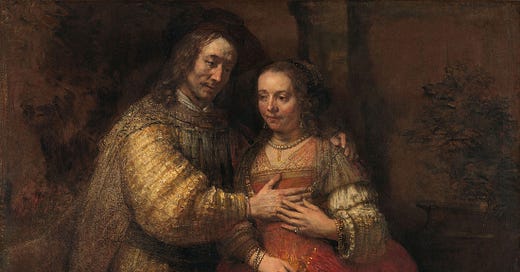Isaac pleaded (vayetar) with the Lord on behalf of his wife, because she was barren; and the Lord responded (vayeater) to his plea, and his wife Rebekah conceived. (Genesis 25:21)
So Moses left Pharaoh’s presence and pleaded with the Lord. (Exodus 8:26)
So Moses left Pharaoh’s presence and pleaded with the Lord. (Exodus 10:18)
Rabbi Yehuda says: Manasseh has a share in the World-to-Come, as it is stated concerning Manasseh: “And he prayed to Him, and He received his entreaty, and heard his supplication and brought him back to Jerusalem unto his kingdom” (II Chronicles 33:13) (Mishna Sanhedrin 10:2)
Sarah, Rebecca, and Rachel all struggle with fertility, but neither Abraham nor Jacob plead with God to open their wives’ wombs. Abraham, instead, fathers a child with Hagar—at Sarah’s suggestion; a human work-around that begets greater conflict down the line. Jacob, meanwhile, reproduces with Leah, while assuring Rachel that she is loved. In the case of both Abraham and Jacob, their wives experience infertility as isolating, as their burden to bear. Sarah and Hagar find themselves in bitter rivalry; ditto, Rachel and Leah. Only in the case of Rebecca and Isaac, do we find an example of a couple that shares an existential burden.
The word that the Torah uses to describe Isaac’s plea—vayetar—is uncommon. It appears only once in Genesis. The same root word appears twice in the verse, as God’s answer—vaye’ater—suggests an echo to the plea. While one might think of this word as underscoring a sense of urgency or concern, the contextual contrast with Abraham and Jacob suggests that it may also be about intercession on behalf of someone else with whom one identifies. That is, the plea is not just a plea for a result, but a plea for a result for someone who is as if oneself.
In two cases, Moses pleads with God on behalf of the Egyptian people, using the same word. We know that Moses was raised in Egypt and we can now speculate that Moses’s prayer to God to suspend the plague may come from his own relationship to the Egyptians. Although he wants the Israelites to be free, he hopes, momentarily, that it might come without harm to the Egyptian populace. God does suspend the plagues, but only briefly—the intercession works, but eventually breaks down as Moses the Egyptian is forced to become Moses the leader of the Israelites.
While the wicked King Menashe doesn’t plead with God, God responds to his plea with the same language that God responds to Isaac, suggesting that his plea is implicit. He longs to do teshuva, to repent. Thus, the Mishna tells us that he regained his share in the World to Come after having lost it. Just as a plea can open the womb or pause a plague, it can also forestall and reverse damnation.
Taking Isaac as foundational, we can imagine that the power of Moses’s and Mensashe’s pleas derive not from their emotional intensity, nor from their logic, but from their demonstration of a shared burden. They elicit a divine reaction because in demonstrating a willingness to share the burden with others, they entice God to share the burden with humanity.
The plea is neither selfish nor altruistic. Isaac doesn’t pray for the Canaanite women, but only for his own wife. Yet nor is it purely self-centered, because as we see from the contrasting case of Abraham and Jacob, Isaac might have found a way to sire children without Rebecca. But no. Theologically, Isaac’s love for Rebecca becomes the model for God’s love of us. God loves us—we hope—selflessly and selfishly.
Were God purely selfish, God might destroy humanity and start over with a different partner, as God entertains during the story of the Flood. God rules that out. Were God purely selfless, God would not pick favorites and would simply engage in random acts of kindness or else purely calculated ones a la Effective Altruism. God prefers investing in relationships that compound over generations. An ethical hit here and there doesn’t move the needle compared to a “buy and hold” strategy. Genesis teaches that God takes this long-term approach to humanity in the story of Noah, Abraham’s lineage in the story of Abraham, and, Israel and the Jewish people through the story of Jacob. Isaac is the bridge between Abrahamic universalism and Jacobite favoritism. Just as God won’t give up on humanity, and God won’t give up on the children of Abraham, God won’t give up on the Jewish people — who are likened by analogy to Rebecca. God pleads for us, just as Isaac pleads for Rebecca.
Jewish chosenness is often contemplated in the context of sibling rivalry: Isaac vs Ishmael, Jacob vs. Esau. But it can also be thought about without rivalry in the example of Isaac and Rebecca simply as commitment. Isaac commits to Rebecca. Isaac assumes her burden as his burden. There is no intended rejection of others implied by this model. Isaac’s attitude is simply a recognition that we are in this together. This is the attitude that God takes towards the Jewish people. Where the Jewish people is endangered, God is endangered. Where Jewish continuity is threatened, divine continuity is threatened.
When considering Isaac’s prayer mechanistically, moderns may find themselves in disbelief that it works. Many of us pray for things that don’t come to pass. A better way to understand it is that it reveals or unconceals a truth that is already known: God’s commitment to the Jewish people requires Isaac and Rebecca to have a child. But it’s also a test: will Isaac wait passively for God to do something or will Isaac specifically single out Rebecca as core to his story. As I wrote this week, “Religion is social.” Isaac’s prayerful moment is generated by his love of his wife. For Isaac, human love becomes the path to love of God love.


